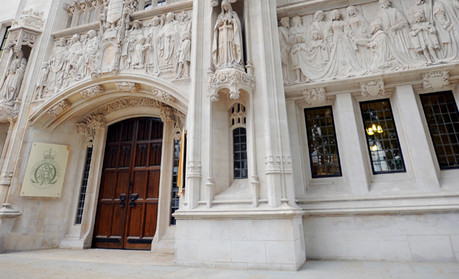
The Supreme Court judge found today that: 'The article, although undoubtedly damaging to DS Flood’s immediate reputation, was balanced in content and tone.'
Credit: Fiona Hanson/PAThe Supreme Court today found that an article published by the newspaper, carrying allegations against a detective sergeant in the Metropolitan Police, was protected by Reynolds privilege.
The Times announced in July 2010 that it would seek to appeal a judgment by the Court of Appeal, which overturned a previous ruling that the newspaper was entitled to a defence of 'Reynolds privilege' in the case of Flood v the Times Newspapers, that a story has resulted from "responsible journalism" and is in the public interest.
In 2009 the high court found that in this case [paywall], an article published by the Times which reported on allegations against Gary Flood, an officer with the Metropolitan Police, was protected by qualified privilege, based on the Reynolds test of responsible journalism.
But the court, which heard that a DPS investigation later cleared Flood of corruption, found that the online version had lost this privilege as it was not updated to show Flood had been cleared upon being informed of this on 5 September 2007.
In 2010 the Court of Appeal overturned the first ruling and upheld the second, saying the reporting of allegations in the original newspaper article also failed to be protected.
In today's unanimous ruling in the Supreme Court, the judge found that: "The article, although undoubtedly damaging to DS Flood’s immediate reputation, was balanced in content and tone.
"... It did not assert the truth of the reported allegations of impropriety made by the ISC insider, but it identified them as the basis of an investigation in progress to establish whether there had been any impropriety.
"DS Flood and all others implicated in the allegations of impropriety were given the opportunity of commenting, and their denials in that regard were in each case recorded. Such omissions as there may have been in the reporting were in the overall context minor."
As a result "there was, in my judgment, no good reason for the Court of Appeal to depart from the judge’s overall assessment that publication of the article was in the public interest, despite its immediate adverse effect on DS Flood’s reputation. On the contrary, I agree with the judge’s assessment."
In reference to the online article, which has also been appealed by the Times, the Supreme Court judgment states that there was not enough time to enable the court to hear the argument in relation to this issue.
"The DPS report clearing Sergeant Flood was made, internally, on 2 December 2006. Its result was not communicated to TNL until 5 September 2007.
"On that date the Article still remained on the TNL website, and TNL neither removed it nor qualified it. In these circumstances, Tugendhat J held that the protection of Reynolds privilege did not extend beyond 5 September 2007.
"Before the Court of Appeal TNL appealed without success against that finding. They have appealed against it before this Court."
The court said "it was agreed that it should be adjourned, to be pursued, if appropriate, after judgment had been given in respect of the first limb of the appeal".
"The Court is prepared to hear submissions on the second limb if so requested."
Update: Editor of the Times James Harding has issued a statement in response to the ruling:
"The Times welcomes such a clear statement from the highest court in the land on the importance of investigative reporting.
"The Supreme Court has ruled decisively in favour of the paper on the role of the press and the public’s right to know. This is a landmark decision in favour of responsible journalism in the public interest. I hope that all those considering the future of press freedom will reflect on the Court’s findings".
Free daily newsletter
If you like our news and feature articles, you can sign up to receive our free daily (Mon-Fri) email newsletter (mobile friendly).
Related articles
- Three steps to protect newsrooms from press freedom attacks
- What journalists can do to prevent and fight SLAPPs
- Newsrewired special: How The Times is running towards a digital-first future
- Subscription retention strategies: pain points and remedies
- How should the media cover COP26 and climate change long-term?









